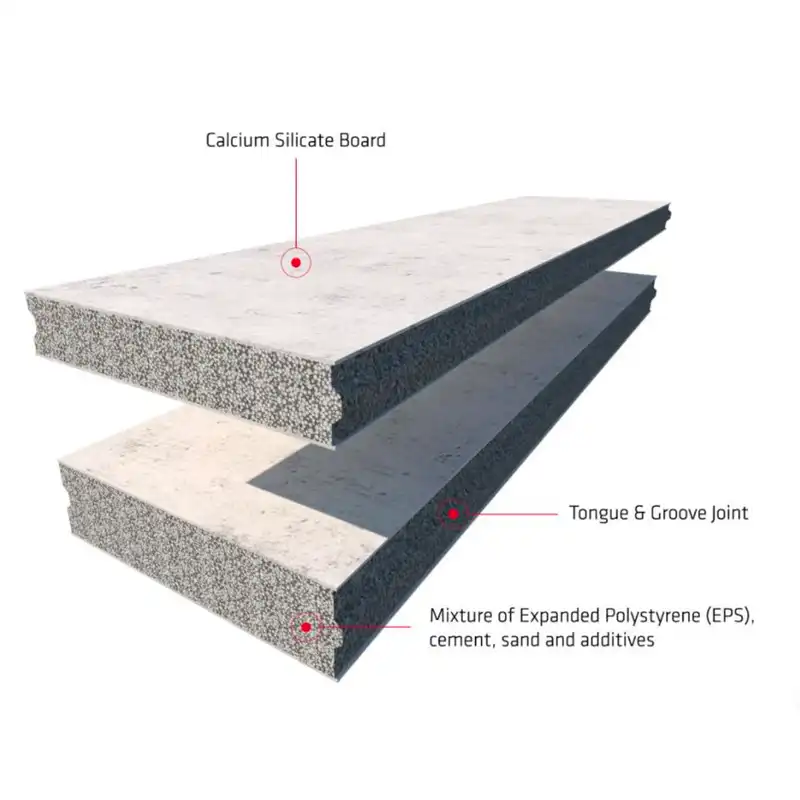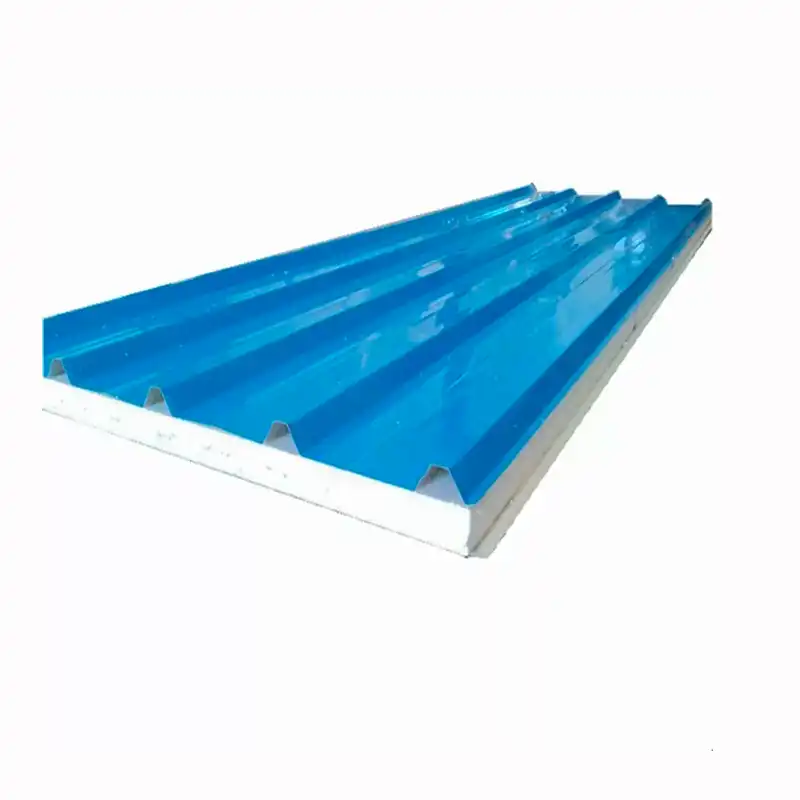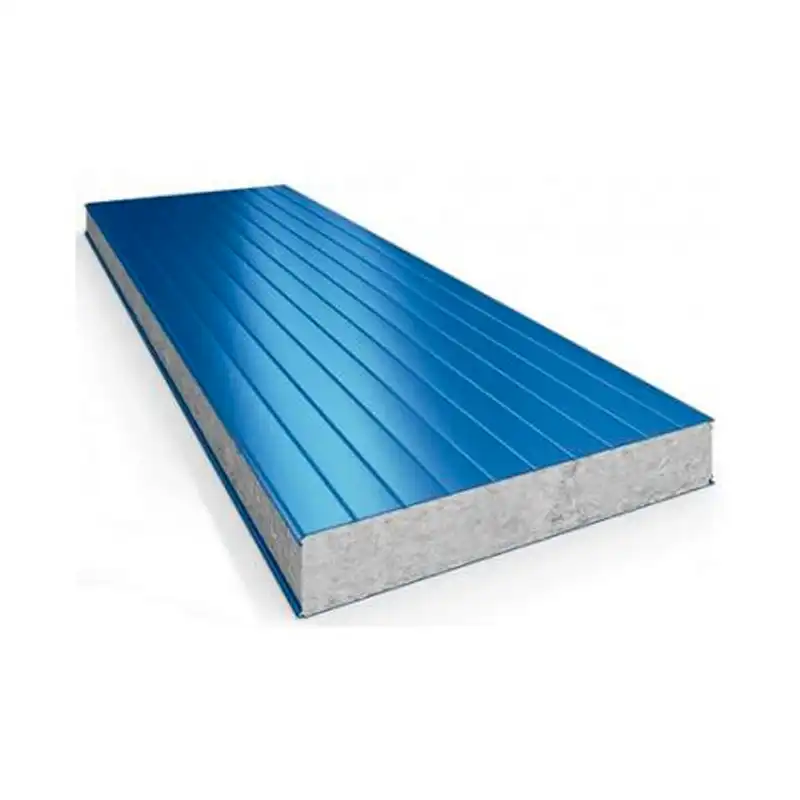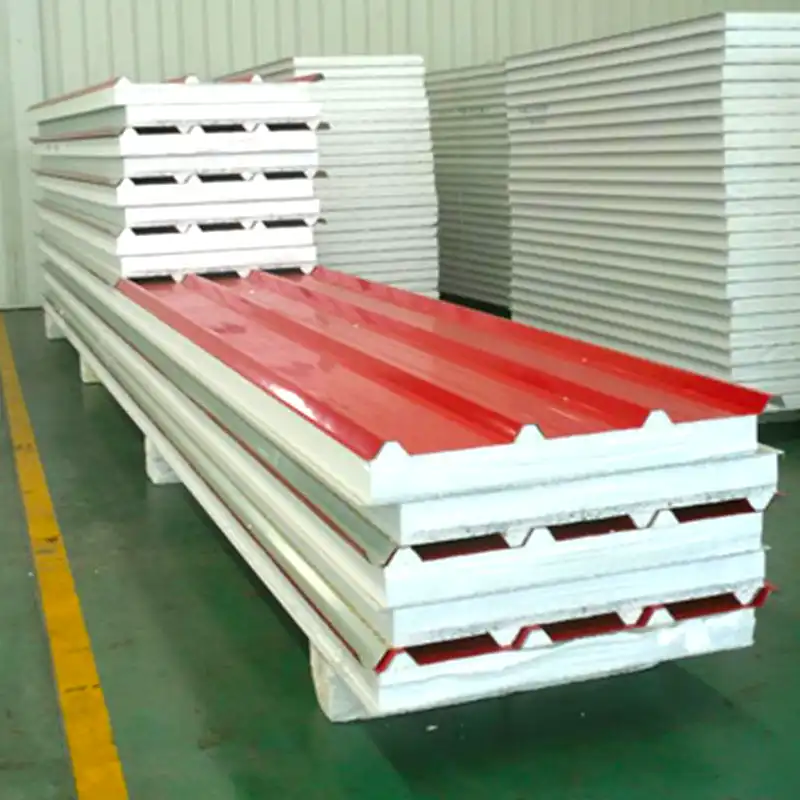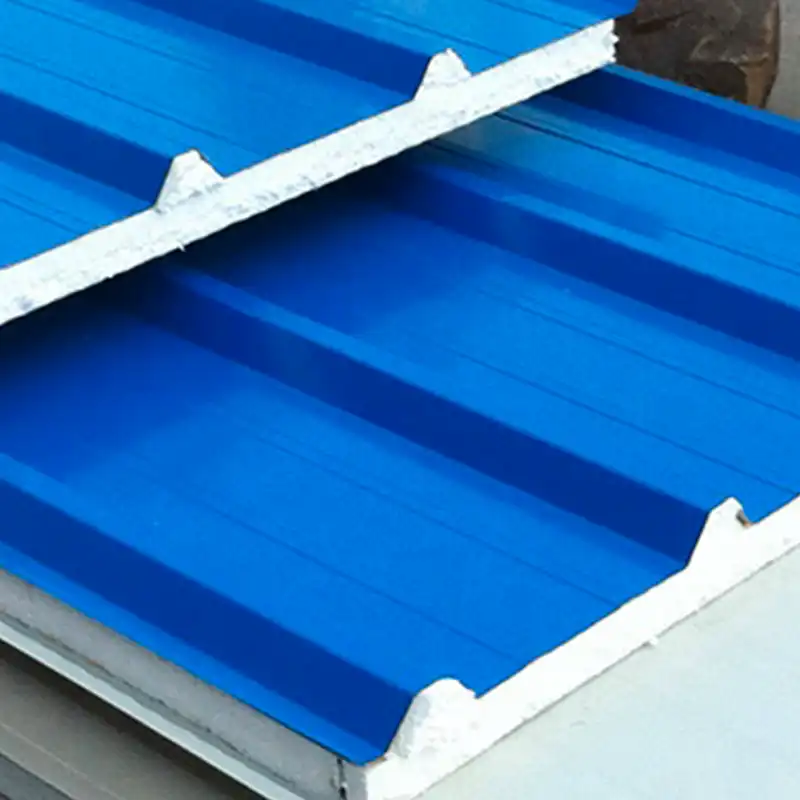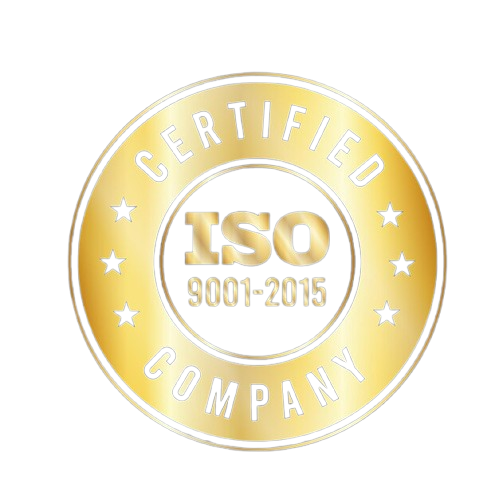Importing EPS Sandwich Panel From China for Your Construction Industry
Discover the Benefits of Importing EPS Sandwich Panels from China for Your Construction Projects. Explore high-quality, cost-effective solutions for insulation and structural needs. Quote your desired EPS sandwich panels now.
EPS sandwich panel construction
EPS (Expanded Polystyrene) sandwich panels typically consist of the following layers:
Outer Facing Material: The outer layers of the panel are often made from materials like steel, aluminum, or other metals. These materials provide protection and structural support to the panel.
EPS Core: The core of the sandwich panel is made of Expanded Polystyrene foam. EPS is known for its excellent insulating properties and lightweight nature. It provides thermal insulation and structural integrity to the panel.
Adhesive Layer: An adhesive or bonding layer is used to adhere the EPS core to the outer facing materials. This layer ensures the panel remains structurally sound and provides insulation.
These layers work together to create a strong, lightweight, and thermally efficient construction material suitable for a wide range of applications, such as walls, roofs, and floors in the construction industry.
EPS sandwich Roof panel
EPS (Expanded Polystyrene) Sandwich Roof Panels are an innovative and efficient solution for roofing applications, and it offers a combination of durability, insulation, and ease of installation. These roof sandwich panels are designed to provide a reliable and cost-effective roofing solution for a variety of buildings, including residential, commercial, and industrial structures
EPS sandwich panel Features
Modular Construction: EPS sandwich panels are modular in nature, designed for easy and precise pre-engineered construction. This modular approach saves time during the building process.
Finishing Options: These panels offer multiple finishing options, including PPGS (Pre-Painted Galvanized Steel) and PPGL (Pre-Painted Galvalume) coatings, allowing for aesthetic customization.
Versatile Dimensions: They come in a variety of dimensions, offering flexibility in design and construction projects.
Constant Thermal Resistance: EPS sandwich panels maintain a consistent thermal resistance, ensuring that the insulation performance remains reliable.
Lightweight: These panels are lightweight, making them easy to lift and install, even in high-altitude locations.
Frameless Construction: The frameless construction of these panels provides flexibility in design, supply, and installation, making them suitable for various structure types.
Energy Efficiency: EPS sandwich panels contribute to measurable energy savings by providing excellent insulation and minimizing heat loss, resulting in highly efficient building performance.
Durability: They are tough and long-lasting, making them suitable for use in various construction projects where durability is essential.
Long Life and Low Maintenance: With proper maintenance, EPS sandwich panels have a long lifespan, and they require minimal maintenance, reducing overall costs over time.
EPS Sandwich Panel Manufacturer
We have the leading EPS sandwich panel manufacturer, which is located in Qingdao China.
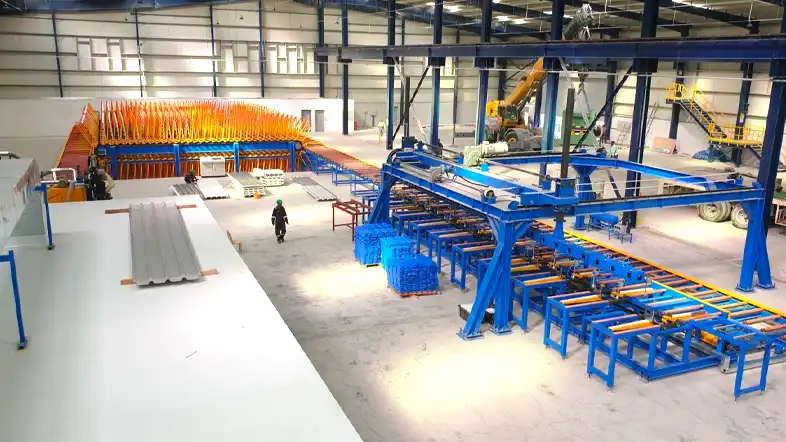
EPS (Expanded Polystyrene) sandwich panel manufacturers play a crucial role in the construction and building industry by producing versatile and cost-effective building materials. These manufacturers specialize in the production of sandwich panels that consist of a rigid EPS foam core sandwiched between outer facing materials, often made of steel, aluminum, or other metals. Here are some key points to know about EPS sandwich panel manufacturers:
Product Variety: EPS sandwich panel manufacturers offer a wide range of products with varying thicknesses, sizes, and facing material options to cater to different construction needs. This versatility makes them suitable for various applications, from residential housing to industrial structures.
Customization: Many manufacturers can customize EPS sandwich panels according to the specific requirements of a project. This includes tailoring the thickness, facing materials, coatings, and other properties to meet thermal insulation and structural demands.
Quality Assurance: Reputable manufacturers prioritize quality control in their production processes. They often adhere to industry standards and certifications to ensure that the panels meet or exceed safety and performance requirements.
Innovative Technology: Leading manufacturers frequently invest in research and development to improve the performance and sustainability of their products. This might involve developing more energy-efficient panels, fire-resistant coatings, or environmentally friendly production methods.
Environmental Considerations: As environmental consciousness grows, some manufacturers have adopted eco-friendly practices and materials. They may focus on using recycled or recyclable materials and reducing the carbon footprint of their production processes.
Local and Global Presence: EPS sandwich panel manufacturers can operate on a local, regional, or global scale, providing materials to construction projects worldwide. Local manufacturers may offer advantages in terms of quicker delivery and support for nearby projects.
Technical Support: Many manufacturers offer technical support, including installation guidelines and assistance, helping customers ensure proper use and installation of their EPS sandwich panels.
Cost-Effective Solutions: EPS sandwich panels are known for their cost-effectiveness due to their combined insulating and structural properties. Manufacturers often work to provide competitively priced solutions without compromising quality.
Partnerships and Distribution: Manufacturers may collaborate with distributors and suppliers to make their products widely available. These partnerships can improve accessibility for contractors and builders.
Regulatory Compliance: Reputable manufacturers understand and adhere to local and international building codes and regulations to ensure their products meet safety and quality standards.
EPS sandwich panel production line
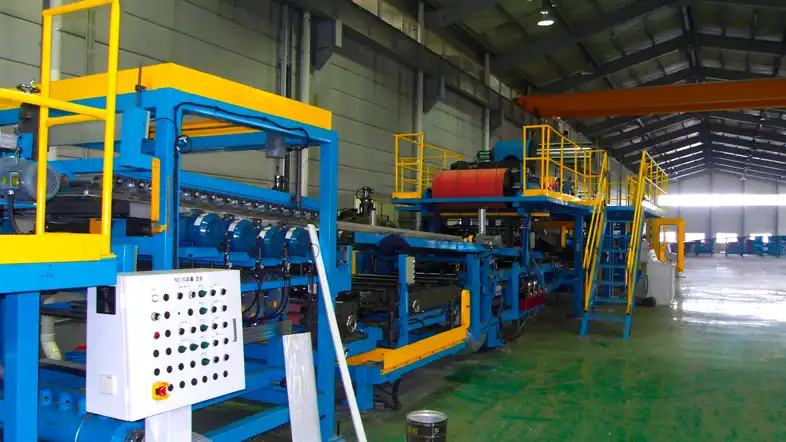
The production of EPS (Expanded Polystyrene) sandwich panels involves a well-organized and efficient manufacturing process. This process ensures the creation of high-quality panels that meet various construction and insulation needs.
Why Choose EPS Sandwich Panel
EPS (Expanded Polystyrene) sandwich panels are a popular building material choice for various construction applications due to their numerous advantages. Here are some main reasons why you might consider using EPS sandwich panels:
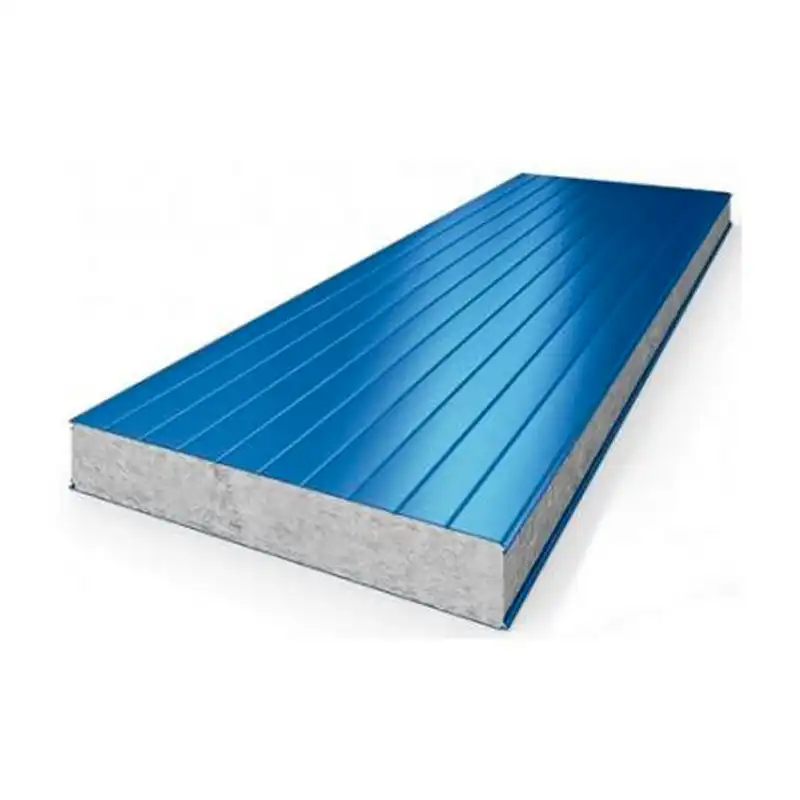
Excellent Insulation: EPS sandwich panels offer excellent thermal insulation properties. The insulating core of expanded polystyrene helps regulate indoor temperatures, reducing the need for additional heating or cooling.
Lightweight: EPS panel sandwich is relatively lightweight, making them easy to handle and install.
Cost-Effective: The combination of insulation and lightweight properties means that EPS panels are cost-effective in both the short and long term.
High Strength: Despite their lightweight nature, EPS panels are structurally sound and can provide significant structural support.
Sound Insulation: In addition to thermal insulation, EPS panels also provide good sound insulation. They can help reduce noise pollution, creating a quieter and more comfortable living or working environment.
Fire Resistance: EPS panels can be manufactured with fire-resistant coatings to enhance their fire resistance. This makes them suitable for applications where fire safety is a concern.
Customization: EPS sandwich panels are highly customizable in terms of thickness, surface finish, and color, allowing architects and builders to tailor them to specific design and aesthetic requirements.
Quick Installation: The prefabricated nature of EPS sandwich panels makes them easy and quick to install. This can reduce construction time, minimizing disruptions and allowing buildings to be occupied sooner.
EPS Sandwich Panel Applications
Here are some applications for EPS (Expanded Polystyrene) sandwich panels:
Wall Systems: Used for exterior and interior walls in various buildings.
Roofing: Ideal for roofing structures, offering insulation and weather protection.
Cold Storage Facilities: Maintain temperature control in refrigerated storage spaces.
Prefab Buildings: Speed up construction with quick assembly of modular structures.
Partition Walls: Create flexible interior layouts with lightweight partition walls.
Ceilings: Provide insulation and finished surfaces for ceilings.
Clean Rooms: Construct controlled environments for pharmaceutical, electronics, and food industries.
Agricultural Buildings: Suitable for livestock housing, barns, and crop storage.
Residential Construction: Used in homes for energy-efficient walls and roofs.
Commercial Buildings: Commonly used in offices, retail stores, and warehouses.
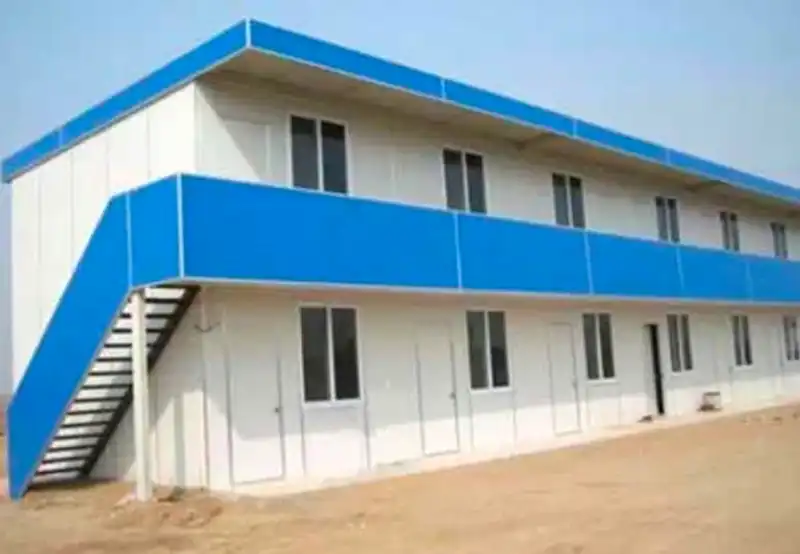
What is an EPS sandwich panel?
An EPS sandwich panel is a composite construction material consisting of an Expanded Polystyrene (EPS) foam core sandwiched between two outer facing materials, typically made of steel or aluminum. These panels are used for their insulating and structural properties in various construction applications.
What are the advantages of using EPS sandwich panels in construction?
EPS sandwich panels offer excellent thermal insulation, lightweight construction, and quick installation. They are also cost-effective and provide good structural strength, making them ideal for walls, roofs, and floors in buildings.
What Comprises EPS Sandwich Panel?
An EPS Sandwich Panel comprises an EPS foam core and two outer layers of metal, often steel or aluminum. These layers provide strength, durability, and protection against external elements.
What Sizes Are EPS Sandwich Panels?
EPS Sandwich Panels are available in various standardized sizes, and their dimensions can be customized to suit specific project requirements.
Are EPS sandwich panels fire-resistant?
EPS foam is flammable, so EPS sandwich panels may not be inherently fire-resistant. However, these panels can be manufactured with fire-resistant facing materials or coatings to improve their fire resistance.
How do EPS sandwich panels compare to other insulation materials like fiberglass or mineral wool?
EPS sandwich panels provide comparable insulation properties to materials like fiberglass and mineral wool, but they offer the added benefit of structural support due to their rigid foam core. They are also known for their ease of installation.
Can EPS sandwich panels be customized in terms of thickness and facing materials?
Yes, EPS sandwich panels can be customized to meet specific project requirements. You can choose various thicknesses, facing materials, and coatings to suit your insulation and structural needs.
Are EPS sandwich panels environmentally friendly?
EPS foam is recyclable, but the environmental impact of EPS sandwich panels depends on factors like manufacturing processes, transportation, and disposal. Some manufacturers produce eco-friendly EPS panels, so it’s essential to inquire about their environmental certifications and practices.
What applications are EPS sandwich panels suitable for?
EPS sandwich panels are commonly used in a wide range of applications, including industrial buildings, warehouses, cold storage facilities, residential construction, and more. They are versatile and can be used for walls, roofs, floors, and partitions.
How long do EPS sandwich panels last?
The lifespan of EPS sandwich panels can vary depending on factors like the quality of materials, maintenance, and environmental conditions. When properly maintained, they can last for several decades.
Do EPS sandwich panels require any special installation techniques?
Installing EPS sandwich panels typically involves fastening them to a supporting structure. Proper installation techniques are essential to ensure airtightness, thermal performance, and structural integrity. It’s advisable to follow manufacturer recommendations and consult with experienced installers.
Why Use EPS Sandwich Panels?
EPS Sandwich Panels are preferred for their insulation efficiency, structural integrity, quick installation, and cost-effectiveness. They contribute to energy savings, are durable, and offer versatility in design.
Are EPS Sandwich Panels Customizable?
Yes, EPS Sandwich Panels are customizable in terms of thickness, profile, and other specifications to meet the unique needs of different construction projects.

